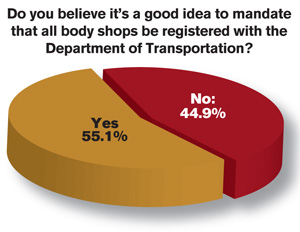Jeff Hendler — Opinion: Yes
Read Bob Smith’s counterpoint arguing why shops shouldn’t register with the DOT.
It’s certainly a pleasure to exchange ideas with Mr. Smith. In this case, however, I pray that we never read, “Mr. Smith Goes to Washington.”
Success Eludes Us
The collision repair industry has been seeking certification, registration, licensing, standards, etc., in every state plus in the U.S. Congress since before I was born. And if you study this history, you’ll see that this effort has not been successful in accomplishing the industry’s intended goals, whether the laws were passed or not. So I ask you to consider supporting a law that would require that every collision repair facility that returns damaged vehicles back to public roadways have a “Department of Transportation” (DOT) number.
To obtain this number, the shop would be required to provide its name, address and contact information along with a minor stipulated fee to the DOT. This DOT number would then have to appear on all estimates, invoices, parts, vendor orders and insurance claim files.
Without a DOT number, it would be illegal for a collision repair facility to be in business and illegal for an insurer to write it a check. With this being the case, it obviously wouldn’t be long before those that are repairing vehicles apply for a number.
Consumer Safety
In a perfect world, I would like every repair facility to have to meet minimum requirements for equipment, training and knowledge, but in the real world, this list of minimum requirements is almost impossible to create – and even more impossible to enforce. But mandating that a shop have a DOT number regardless of its qualifications is the least we can enforce for facilities that repair vehicles and return them to public roadways. That way, we at least know who they are and where they reside. As it stands right now, no one knows the exact number or locations of body shops in the U.S. The intent is not to certify these shops, just identify them.
Every manufacturer and vendor would then have the ability to send the proper repair procedures required for safe repairs to the shops. The ability to disseminate repair information at any given moment is becoming more important with the manufacture of every new car, considering the sophisticated technology and new materials each now contains. Consumer safety is at the top of the list of reasons to demand this simple registration requirement.
Making Shops Legal
Another good reason for mandating registration with the DOT is because we all know that many collision facilities are conducting business illegally. Many have no tax ID numbers and therefore aren’t paying taxes. Many have no EPA permits and therefore aren’t properly disposing of hazardous materials. Many don’t operate within the proper building requirements, OSHA standards and zoning ordinances, and therefore are threats to the safety of their employees and communities.
Once a list of all shops is created, it will be easy to cross-reference between those that are registered with the DOT and those that are registered with the IRS, EPA, and state and local business licensing agencies. And that will make it simple to determine those who are operating illegally.
Enforcement
Once all shops that were legal in the first place are registered with the DOT, they can go back to doing what they do best: repairing vehicles. They won’t be the ones attempting to enforce all of the existing laws and codes. This won’t be a “shop vs. shop” scenario that Mr. Smith thinks it will be. This will be the various governmental agencies that are already authorized to enforce their codes going after the shops that aren’t in compliance with their regulations.
Right now, these agencies prey on the legal shops because those are the only ones they can find. It will be in the best interest of the IRS to find those that aren’t paying taxes. It will be in the best interest of the EPA to find those that aren’t properly disposing of their waste. In these times of budget restraints, it’s in every agency’s interest to justify their existence, and they can self-fund their efforts with the fines they collect and the businesses they close. These agencies exist for a reason, so let’s put them to work on our behalf. Remember, the criminal justice system didn’t bring down Al Capone – the IRS did!
The Alternative
Until we can successfully identify shops that aren’t in compliance with existing regulations, we’ll continue to have to compete against them in the marketplace. Our industry is constantly judged by the lowest common denominator, and those who choose to work outside of the existing business regulations set that denominator. Find them, close them or compete against them.
As Mr. Smith stated: “You make the choice.”
Read Bob Smith’s counterpoint arguing why shops shouldn’t register with the DOT.














